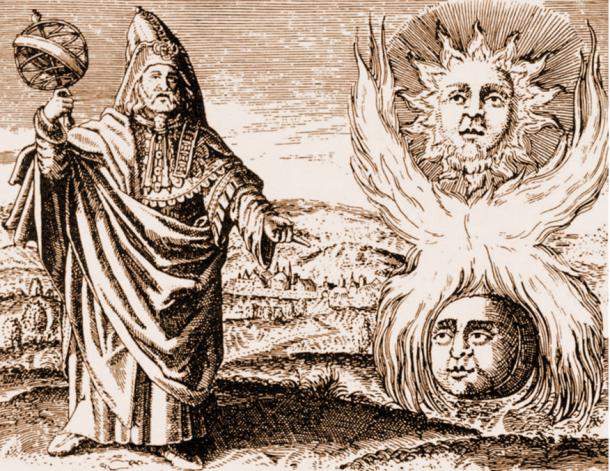Welcome to a world of lucky charms, incantations, amulets, and divination. Welcome to the daily life of an Ephesian. Acts tells us that magic was prevalent throughout the Roman world.
Acts 8.9 tells us about Simon the magician, “But there was a man named Simon, who had previously practiced magic in the city and amazed the people of Samaria, saying that he himself was somebody great.”
And Luke tells us Acts 13.6 about Bar-Jesus, “When they had gone through the whole island as far as Paphos, they came upon a certain magician, a Jewish false prophet named Bar-Jesus.”
Yet it was in Ephesus where, after turning to Christ, “a number of those who had practiced magic arts brought their books together and burned them in the sight of all. And they counted the value of them and found it came to fifty thousand pieces of silver” (Acts 19.19).
It’s hard for most westerners to imagine a life (even a day) where people lived in fear of the dark, unseen forces that surrounded them. In his commentary on Ephesians, S. M. Baugh gives us a few examples into the Greco-Roman and Ephesian mind.
One of Greece’s earliest poets, Hesiod, advised people to “take nothing to eat or to wash with from uncharmed pots, for in them there is mischief” (133).
But nobody cleans a pot and calls it a day. Theophrastus said that the superstitious man “is apt to purify his house frequently, claiming Hekate has bewitched it” (133).
And while many today like turtles (I grew up with plenty in and around my house) because they’re cute, in antiquity the “discovery of a tortoise is particularly lucky, for this animal was ‘a bulwark against baneful spells’” according to the Homeric Hymns (133).
Baugh says that “[f]amous witches like Circe or Medea dot Hellenistic literature with their use of ‘noxious roots of the earth,’ the evil eye, and mystic incantations and rites too fearful even to recount” (134).
These witches were devotees of the “night-stalking Hekate.” The Hymn to Hecate describes Hakate as, “Lovely Hecate … reveling in the souls of the dead … monstrous queen … of repelling countenance.” She was a “fierce mistress of the black arts who had an active cult* throughout Asia Minor, including many references in the remains from Ephesus” (134).
Simply because one became a Christian did not mean that person was no longer tempted to believe in the effects of magic. There was always a pull to conform to the rest of society, to partake in the discussions and practices of warding off the evil spirits with various spells and amulets.

Early postbiblical writers repeatedly warn their readers to stay away from the “black arts.”
In the Epistle of Barnabas 20.1, the author says, “But the way of the Black One is crooked and full of a curse. For it is a way of eternal death with punishment wherein are the things that destroy men’s souls—idolatry, boldness, exaltation of power, hypocrisy… witchcraft, magic, covetousness, absence of the fear of God.”
And Didache 3.4 says, “My child, be no dealer in omens, since it leads to idolatry, nor an enchanter nor an astrologer nor a magician, neither be willing to look at them; for from all these things idolatry is engendered.”
In Ignatius’ letter to the Ephesians, he said that Christ’s incarnation “has dissolved all magic practices… and the bondage of evil and ignorance; the old kingdom of the prince of this age has been destroyed” (134).
“From that time forward every sorcery and every spell was dissolved, the ignorance of wickedness vanished away, the ancient kingdom was pulled down, when God appeared in the likeness of man unto newness of everlasting life; and that which had been perfected in the counsels of God began to take effect. Thence all things were perturbed, because the abolishing of death was taken in hand.”
Christ, Who Has All Things Beneath His Feet
Baugh quotes Clinton Arnold (who wrote a commentary on Ephesians) from Arnold’s book Power and Magic on the background of the Ephesians and their culture of magic. Arnold says:
God’s superior power is available to believers and is working for their best interest—he desires to mediate it to his people for their protection and growth. Believers are depicted as having been transplanted from one sphere of power (kingdom, or dominion) and placed in another. This transfer forms the basis for their access to the power of God. There is therefore no need for believers to seek any additional protection from the “powers” by any means. This would include the devising of ways to manipulate the demons or the invoking of angelic assistance. (134-35, fn 289)
This is simply one of the gifts given by the grace of God our Father which comes through faith in Christ alone. It is Christ who sits at the right hand of God (Eph 1.20). It is Christ who sits in the heavenly places, far above all rule and authority and power and dominion, and above every name that is named, not only in this age but also in the one to come (1.20-21). And it is Christ who has “all things under his feet” and who is “head over all things to the church, who is his body, the fullness of him who fills all in all (1.22-23).


Reblogged this on Talmidimblogging.
LikeLike
This is good “background” material Spencer. Sounds like it might be worth having Arnold’s book on “Power and Magic.”
LikeLiked by 1 person
Thanks, Randy. I think Lindsay has it. I’d like to get it myself. His commentary on Ephesians is really good, as it also has a lot of these types of insights.
LikeLike